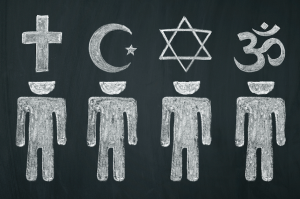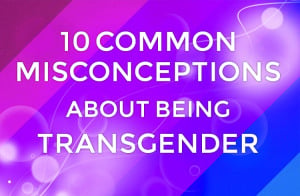
Credit: The Christian Left
The Bible gets a bad rap in many feminist circles. As someone raised in the Christian church, I don’t blame them.
It was written, translated, and interpreted by men in deeply patriarchal societies. While Christianity has modernized with the times, it still too often lives and acts from the legacy of patriarchy.
Its teachings are, to say the least, reflective of that.
But despite its passing through generations of flawed hands in flawed societies, its core truths remain.
They are beautiful. They are feminist.
I know a lot of feminists and Christians are shaking their heads right now at this concept. They feel that Christianity is so filled with patriarchal traditions (and it is).
But let me ask you, is it worth focusing on what divides us instead of what unites us?
Should we use these Christian feminist teachings to end the division between Christians and feminists, between Christian feminists and non-religious feminists?
As a feminist who loves many Christians, I say yes.
1. We are all worthy, beautiful, and loved.
“Though the mountains be shaken and the hills be removed, yet my unfailing love for you will not be shaken nor my covenant of peace be removed” – Isaiah 54:10
The Bible is so flooded with messages about God’s love for us. We are both loved immensely and capable of loving immensely. Most importantly, we must love ourselves because we are important and were made with care.
The Bible says that God made us each in his own image, wove us together in the depths of the Earth, and formed each of our delicate body parts for us alone. Our bodies are temples of the Holy Spirit and we should love them and care for them. He has a unique plan for each of us, has given each of us hope and a future, and has prepared a place for each of us in Heaven.
We are exactly as we should be. We are perfectly imperfect. We are beautifully unique.
2. We all have direct access to God.
“Those who seek me find me.” – Proverbs 8:17
In patriarchal societies, hierarchies exist that give certain people privileged access to knowledge, status, and power. Similarly, patriarchal religions make distinctions between ministers and laypeople, decision-makers and decision-followers, and in many ways, men and women. Such distinctions can make many feel powerless and far from God.
This is not what God wants for us.
In the Bible, Jesus made it very clear that he was available to all, directly and without mediators. He practiced this wholeheartedly by blessing and preaching to all people even when it went against traditions and social norms. When his apostles’ were apprehensive about interacting with certain groups, like the diseased, sinful, and female, He was not.
Jesus preaches to all people and lets us know “we may approach God with freedom and confidence.”
3. We shouldn’t judge each other.
“Who are you to judge your neighbor?” – James 4:12
When we see religious doctrines that discriminate and pit one religion against another, it may seem like Christianity is not really all about love. But it is!
Or at least, it should be! Jesus said that his disciples would stand out in any society because of their unwavering love for others. Above all else, He says, “love one another, as I have loved you.”
In the Gospel of John, a group of religious men wanted to stone a woman accused of sexual improprieties. The men asked Jesus what he thinks should be done and He said, “If any one of you is without sin, let him be the first to throw a stone at her.” All the men, who cannot say they have never sinned, left one by one. When Jesus was alone with the woman, He forgave her and sent her on her way.
When we see religious practices that judge others for their behaviors, this is also not the way of Jesus.
4. Social status doesn’t matter.
“There is neither Jew nor Greek, slave nor free, male nor female, for you are all one in Christ Jesus.” – Galatians 3:28
Jesus didn’t care for social status and served all people regardless of gender, class, or history of sin. He said we are all His children and He meant it.
In practice, this meant often going against the strict social order of the time, if it kept people from Him.
In Gospel of Luke, Jesus was at the home of Martha and Mary. Martha went about her housework while Mary sat at Jesus’ feet and listened. Martha asked Jesus to instruct her sister to perform her proper role and help her with the chores. Jesus answered, “Mary has chosen what is better, and it will not be taken away from her.”
Jesus did not pay much mind to social institutions. When his apostles protested, he reminded them that these categories are of the earth. We are all equal and free in Heaven.
5. We should help people in need.
“Dear Children, let us not love with words or tongue, but with actions.” – 1 John 3:18
Helping those in need is a cornerstone of Christian faith. We are called to serve the “poor,” any poor, in radical ways. Proverbs tells us that when we give to the poor, we give to the Lord himself and that whoever oppresses a poor man offends his Maker.
Jesus was a true advocate for the outcasts and downtrodden of his time, including lepers, prostitutes, mourners, prisoners, widows, orphans, and sinners. He asked us not only to give and then walk away, but to “bear one another’s burdens.”
When we ignore someone’s suffering, we ignore what Jesus taught us.
Embracing Values of Love
Some feminists feel their values are at odds with Christianity and fail to see Christians as allies. Some Christian feminists feel misunderstood, disempowered, and discriminated against in their own churches as well as amongst some other feminists.
This division is the result of how patriarchy has distorted the true teachings of love, humanity, and forgiveness of Jesus Christ. This division between Christian feminists and non-religious feminists is something feminism should be fighting against.
It has prevented Christians from feeling like they can embrace feminism even if they agree with the values. It has prevented Christian feminists from being openly religious and feeling comfortable exploring their spirituality. It has kept us from bonding with each other when we have the same values.
By supporting this judgement and separation, we are not following our feminist or Christian values. We are not trying to understand and value the differences in people. We are not working to change how people are pitted against one another.
Feminist and Christian feminists alike need to bridge this gap and come to see each other as brothers and sisters. We all stand for the same values of respect, equality, and humanity for all people.
Whether we call them feminist values or Christian values, it doesn’t really matter.
What matters is that everyday we act from these values and treat ourselves and others with love and respect.
Amen.
Katy Kreitler is a Contributing Writer for Everyday Feminism as well as a counselor and youth advocate. She can be found wandering the streets of San Francisco with a purse full of used fiction, a pair of emergency yoga pants, and half a burrito.
Search our 3000+ articles!
Read our articles about:
Our online racial justice training
Used by hundreds of universities, non-profits, and businesses.
Click to learn more
Most Read Articles
- « Previous
- 1
- …
- 30
- 31
- 32



















